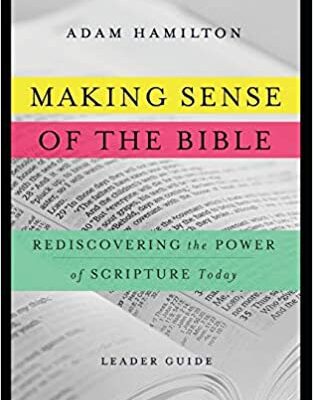Making Sense of the Bible is a very apt title for this book. Sometimes, we might forget that is the point of Scripture to begin with. It’s one thing to read the words, but what do they mean? And to be honest, since these words were written thousands of years ago, are they still applicable today? These are but a few of the questions presented in this book, and I would highly encourage you to give it a read.
To be completely honest, up until a few months ago I had never read the Bible in its entirety. That’s hardly a claim to fame for any Christian, but I am certain that it is a more prevalent fact than we would care to admit. The truth is that the Bible is hard to read at times. Lamentations and Kings are difficult to slog through. For me, the Old Testament is truly a challenge.
That’s what is so refreshing about Making Sense of the Bible. It offers perspective. Since I have now finished reading the Bible completely, I have resolved to UNDERSTANDING it. And that is a lifelong quest — one with no discernable end. Because the truth about the Bible is that we won’t ever know the truth until we are in the presence of its authors. And by then, it won’t matter.
We can posterize and theorize all we want about what the verses mean, but we don’t actually know. They are just that; theories. Granted, many are well researched theories spanning eons. I am not refuting these at all. But I do believe that Jesus wants us all to have a personal relationship with Him. And, as relationships often do, that might take shape in different ways depending on who you are.
Why I Recommend This Book
For me, I’m not a huge church-goer. I recognize the importance of community and surrounding yourself in an environment of support and faith. I get that. But I can’t get over all of the pious, hypocritical “Christians,” ever since the dawn of Christianity, who continue to defame the religion by their own words and deeds.
Jesus gave us the two most important commandments:
37 Jesus replied: “‘Love the Lord your God with all your heart and with all your soul and with all your mind.’[a] 38 This is the first and greatest commandment. 39 And the second is like it: ‘Love your neighbor as yourself.’[b] 40 All the Law and the Prophets hang on these two commandments.” Matthew 22:37-40
“Christians” who are racist, sexist, homophobic, close-minded, self-seeking need not apply. Those are self-serving agendas. Not God’s. Pay attention the next time you go to Church. Often, those that are the most cavalier about their “faith” are the most hypocritical of all. I firmly believe that Church was the original version of social media “trolling.” A place where a congregation could get together to talk ill about others. And definitely not in line with the Commandments of Christ.
But again, that is my experience with Church. Yours might be different, and I hope that is the case. The point is, it has taken me this long to recover from my experiences with church to get to the point where I am in my relationship with Christ. Making Sense of the Bible has helped.
Now, I am biased, because the author shares a lot of the same views as I do. He reiterates that the authors of scripture were human and capable of errors. Even though they were inspired by God to write what would become the Bible, it was not dictated to them by God. Therefore, it inherently has a humanistic nature to it.
The basic point of this book is to help us gain perspective and insight instead of just reading the words. And if you’re truly serious about studying the Bible, isn’t that the point?
